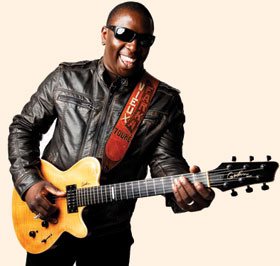Vieux Farka Touré, Queen Elizabeth Hall, London
Simply sign up to the Life & Arts myFT Digest -- delivered directly to your inbox.
Vieux Farka Touré can be infuriatingly inconsistent. A few years ago, he played a late-night set in the foyer of the Barbican, and a tired audience streaming out of the main concert were lured in by trance grooves so irresistible as to constitute a form of mind control. Yet a subsequent Womad appearance was so stolid that even the singing of Khaira Arby could not bring it to life.
His recent records have displayed the same pattern. An American blues excursion was stubbornly earthbound, a collaboration with the Israeli pianist Idan Raichel only fitfully successful. But his recent Mon Pays – a message of solidarity with his Malian homeland in the midst of its civil war – was sublime, sprinkled with kora from Sidiki Diabaté that recalled the duets of the two men’s fathers.
This concert came freighted with accordingly high expectations. Touré was fronting a power trio, with Valery Assouan on bass and Jean-Baptiste Gbadoe on drums. For the first couple of numbers they had a coiled power, Gbadoe tapping on the cymbals as Touré vamped. The songs kept threatening to explode with full force before being reined back in by Touré; his playing was liquid, deceptively smooth. With a minute glance at Assouan, Touré dropped the backing away to a mere tick.
“Have you heard the new album, Mon Pays?” Many had. “It’s very acoustique, very relaxed …” And then, perversely, Touré abandoned the setlist and any hint of the relaxed or the acoustique. “Safare” had dark clouds of pummelled drums, Arabic-sounding guitar scales, lengthy guitar runs each topped off with a screech of strings. “War’s not good,” he noted, introducing “Kele Magni”; “now they’ve stopped the war.” And appropriately the song, on record contemplative, here bounced with bass and drums in a joyous celebration.

Building on that, Touré cajoled the audience to their feet to dance to a jiving township beat, and Touré playing a dance tune in a blizzard of squally feedback, like Jimi Hendrix covering Jimmy Shand.
He switched to acoustic guitar for “Ay Bakoy”, a solo Mandingo blues, and was then joined by the Senegalese kora player, Diabel Cissokho, once part of Baaba Maal’s band, for a breathtaking duet on “Future”: Touré set up a four-bar repeating riff over which Cissokho played soaring high cadenzas.
That was over all too soon, and Touré played a facsimile of his father’s “Diaraby Magni”, his guitar now guttural as Niafunké dust. Then it was back to the dance tunes, all just a shade more ordinary than the concert’s acoustic centrepiece.

Comments